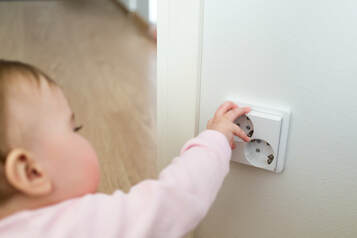
- Serious electric shocks are not as common as many people think. In the UK (2010-11), 60 children (under 15) were admitted to hospital after an electric shock. This compares to 47,000 under 15s admitted to hospital as a result of falls.
- The main danger with electricity is that it can cause house fires. Faulty electrics start up to one in six house fires. Causes include loose wiring, damaged cables and leads, and faulty or misused electrical appliances.
The good news is that children are at very little risk from electric shocks. Electrical sockets are designed to be safe. But electricity can be dangerous in other ways. Old electrical appliances and wiring, and children playing with electrical appliances, can cause burns and house fires. Of the accidents involving electric shocks which take place in the home, many involve children biting electrical cords or poking a metal object into electrical sockets. Or they happen when an electrical appliance meets water such as a bath or paddling pool. Water greatly increases the risk of fatality.
You should be aware of how much your children have learned, and what they are capable of doing with electrical appliances. If you are aware of the dangers of electricity, you can teach your children, as they grow up, to be aware of the dangers too. But younger children might not know the dangers, and they become curious before they know what they are playing with. You may not know your toddler is able to plug in an iron or electric fire.
Most accidents that happen with children and electricity can be prevented by keeping potentially dangerous devices out of young children’s reach and away from water. For example:
- Electrical devices such as hairdryers and mains-operated radios should be kept out of the bathroom
- Plug sockets should not be overloaded. Be aware not just of how many plugs are going into one socket, but also how much power they are using. Kettles and irons use more power than lamps and even TVs.
- Older electrical appliances can cause house fires. Check plugs, sockets and wires for scorching or fraying. If there’s a problem, use a registered electrician to fix them.
The danger from an electrical shock depends on the type of current, how high the voltage is, how the current travelled through the body, the person’s overall health and how quickly the person is treated. If the person survives the initial shock, their prognosis is usually good. However, even when the electric shock is not fatal, it can lead to permanent injury.
Electrical sockets are not the only source of electric current, and babies have little fingers and are curious; hence the importance of knowing the appropriate first aid response. Certain socket covers can damage sockets and remove the automatic shutters – be extremely careful when choosing socket covers to ensure they meet the appropriate safety standards.
Faulty wiring and electric shocks
Old electrical appliances can have wires which become damaged and frayed over time and can, as a result, can give an electric shock when touched. Sometimes pets can chew and damage wires and they too can experience electric shocks.
Have your electrics regularly checked by a qualified electrician!
Electric Shock - what do you do?
Your own safety is paramount!
If you touch someone who is holding onto an electrical wire with a live current, there is a strong chance you will be electrocuted too. As a result, it is vital you always ensure the area is safe if someone has been electrocuted.
Do not touch them until you have turned the electricity off at the mains. Furthermore, ensure you know where the mains is located and how to turn it off. Touching the socket where the appliance is plugged in, before disconnecting the mains, could lead to further injury.
Stop the current!
If someone has had an electric shock, switch off the electrical current at the mains to break the contact between the person and the electrical supply.
Can’t reach the mains supply?
If you can’t stop the electrical current, move the source away from you and the person using a dry, non-conducting object made of cardboard, plastic or wood. A wooden broom handle can work.
If a baby or child has grasped a damaged wire, it is possible the electric shock can cause muscle spasm and as a result they will be unable to let go. Always try and switch off the power supply. Once the electricity has been switched off, they are safe to touch.
When to dial 112 for an ambulance:
If the person isn’t breathing or if the injured person experiences any of the following dial 112.
- Severe burns
- Confusion
- Difficulty breathing
- Heart rhythm problems (arrhythmias)
- Cardiac arrest
- Muscle pain and contractions
- Seizures
- Loss of consciousness
Whilst waiting for medical help:
- Check for response and then check for breathing
- If they are unconscious and breathing – put them into the recovery position
- Unconscious and not breathing – start CPR.
- Conscious and breathing - if they are conscious and appear ok, get them checked by a medical professional.
- be calm and reassuring
- keep them warm and dry
- treat superficial burns with cool, running water
Don’t be distracted by burns!
Electrical burns have an entry and exit point and burn all the way through the inside. Therefore, the electrical burn itself, may not be the most important injury. Furthermore, keep checking for more serious and possibly life -threatening conditions resulting from the electric shock.
For more information on keeping your family safe
Child Accident Prevention Trust:
https://www.capt.org.uk/
Electrical Safety First:
www.electricalsafetyfirst.org.uk/guidance/safety-around-the-home/
Life First provides this information for guidance and it is not in any way a substitute for medical advice. Life First is not responsible or liable for any diagnosis made, or actions taken based on this information. It is strongly advised that you attend a First Aid course to understand what to do in a medical emergency.

